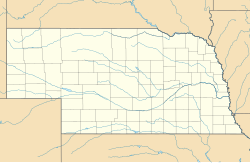Samuel Bullock House | |
 The house in 2010 | |
| Location | 508 West Military Avenue, Fremont, Nebraska |
|---|---|
| Coordinates | 41°26′10″N96°30′08″W / 41.43611°N 96.50222°W |
| Area | less than one acre |
| Built | 1869 |
| Architectural style | Greek Revival, Vernacular Greek Revival |
| NRHP reference No. | 85002147 [1] |
| Added to NRHP | September 12, 1985 |
The Samuel Bullock House, or the Dr Joshua DeVries House, is a historic cottage in Fremont, Nebraska. It was built in 1869, and designed in the Greek Revival architectural style. [2] It was purchased by Arthur Truesdell in 1881; Truesdell was a businessman who served on the boards of directors of the Fremont Foundry and Machine Company and the Fremont National Bank. [2] The cottage was acquired by Dr. Joshua DeVries, a physician and surgeon, in 1893. [2] It has been listed on the National Register of Historic Places since September 12, 1985. [1]

